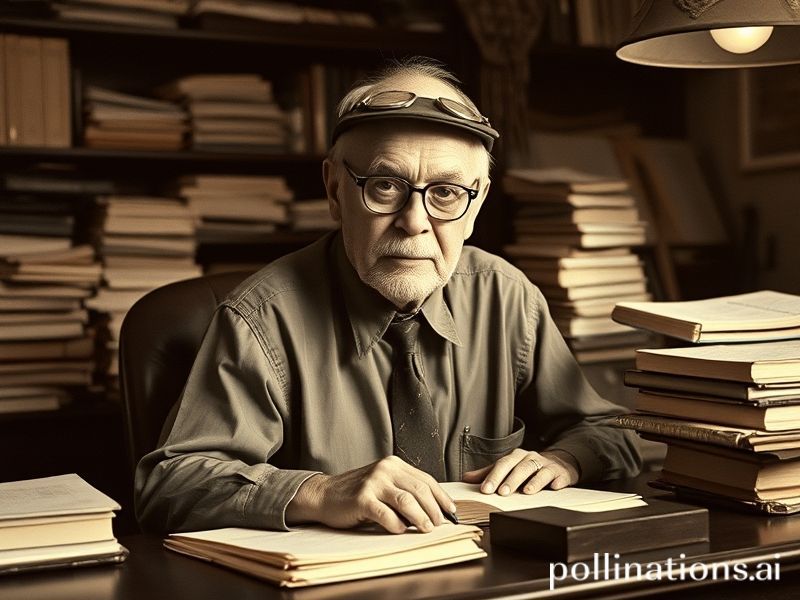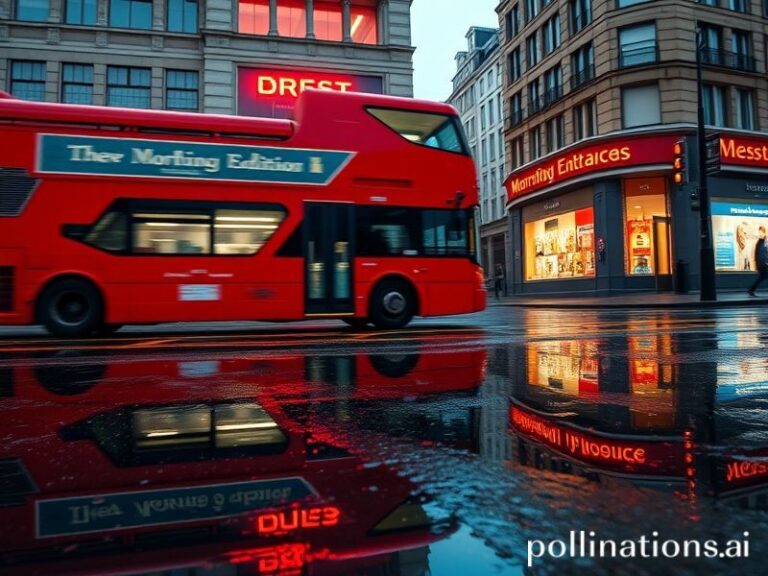One Man, One Glitch, One Trillion: How a British Actuary Briefly Owned the Planet
George Zinn, the mild-mannered British actuary who accidentally became the world’s first trillionaire last Tuesday, is reportedly still trying to pay for his morning espresso with the same crumpled five-pound note. Somewhere between a misplaced decimal in the London Clearing House’s overnight risk model and Singapore’s sovereign wealth fund hitting “execute all,” Zinn’s dormant pension account ballooned to a sum that could bankroll the International Space Station until the sun burns out and still leave enough change for a modest flat in Zurich.
International finance ministries spent the subsequent 48 hours in a synchronized panic that looked like interpretive dance performed by people who’ve never stretched before. The Bank of England froze the transaction, the ECB dispatched three economists who only speak in footnotes, and the U.S. Treasury issued a statement that translated roughly to “nice try, mate.” Meanwhile, the Swiss politely asked if Mr. Zinn would mind depositing the windfall in Geneva “for safekeeping—purely out of courtesy, of course.” The request came with a complimentary fondue set and the sort of smile that historically precedes neutrality.
Because money on that scale is no longer currency; it’s a weather system. Emerging-market currencies wobbled like Jell-O shots at a UN reception, and the Ghanaian cedi staged a brief, inspiring rally after a rogue algorithm mistook it for the new global reserve. Commodity traders in Dubai began pricing crude oil in “micro-Zinns,” a unit so small it can only be observed with an electron microscope or a Goldman Sachs intern. The whole spectacle proved, once again, that the global economy is basically a soufflé: impressive, fragile, and liable to collapse if anyone sneezes near the spreadsheet.
Zinn himself—55, cardigan enthusiast, allergic to shellfish—was reportedly last seen in a Canary Wharf Pret A Manger asking staff if they could break a trillion. Witnesses say he seemed less ecstatic than inconvenienced, like a man who ordered decaf and got a triple espresso with an extra shot of existential dread. His LinkedIn profile still lists “Actuarial Science, Enfield Polytechnic, 1991” under education, followed by the newly ironic endorsement “detail-oriented.”
The affair has sparked a flurry of international think pieces. In Beijing, state media hailed the glitch as proof that Western capitalism is “a casino wearing a monocle.” European regulators promised “sturdier circuit breakers,” which in Eurocrat-speak means another decade of PowerPoint summits in cities chosen for their airport lounges. The IMF convened an emergency Zoom that crashed twice because too many delegates tried to apply the sepia filter at once. And somewhere in Delaware, a limited-liability company registered the trademark “TRILLIONAIRE™” just in case this becomes a lifestyle brand.
Yet beneath the farce lies a darker punchline. While the world’s central banks scurry to mop up the digital spill, 735 million people still live on less than two dollars a day, a figure that hasn’t budged since the invention of the hashtag. The same cloud infrastructure that can conjure a trillion out of thin air still can’t conjure clean water for Flint. And Mr. Zinn, bless his actuarial heart, is learning that once you possess enough money to terraform Mars, the only remaining scarcity is anonymity.
By Friday the error was reversed, the balance zeroed, and George Zinn returned to his cubicle in Tower Hamlets, where the coffee machine still regards him with mechanical indifference. Asked by reporters how it felt to be the planet’s richest man for roughly 36 hours, he shrugged and said, “Honestly, I was more stressed about finding a loo that accepted contactless.” Somewhere in the Cayman Islands, a server quietly logs the incident under “miscellaneous,” right next to the 2008 mortgage crisis and that time a bored teenager in Manila shorted the yen because a fortune cookie told him to.
And so the world spins on, slightly dizzier, none the wiser, and still unable to agree on who should pick up the bar tab at the next G20 summit.







